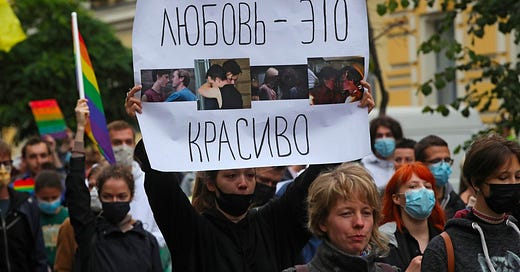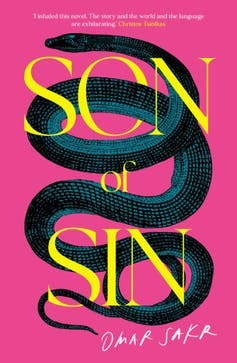Global Roundup: Ukraine’s LGBTQ+ Community Rallying to Resist Russian Invasion, Reemergence of Lesbian Bars Across the U.S., New Novel Challenges Heterosexual Norms of Arab-Australian Culture
Curated by FG intern Jana Kortam
A protester at last year's Kyiv Pride holds a sign reading 'Love is beautiful.’ Ukrinform / Alamy Stock Photo via Open Democracy
Cay, a non-binary queer activist with Queer Rebels who last year graffitied queer messages onto Kyiv’s city’s walls, joined bold actions like hanging a rainbow flag in front of Kyiv National University, and was involved in organising a ‘queer-anarchist’ bloc at Kyiv Pride, has decided to stay in Kyiv to fight. They described their first instinct was to get dressed, grab their ‘go-bag’ and rush to the subway to travel to stay with their father. However, after further thought, as they were arriving at the station, Cay decided to turn back.
I have only slept a total of four hours since the war started..After spending most of the first two days in a bomb shelter with my friend, I’m now starting to find the energy to do something…I’ll also be making Molotov cocktails with my friends to use against the Russian army. - Cay
Cay graffitied queer messages against neo-Nazis. They explain in this interview what queer anarchism is and why it must not be limited to the struggle for queer and trans liberation but must be intersectional and include the fight against racism, ableism, misogyny, and climate injustice.
Russia has gained a reputation for its horrid treatment of the LGBTQ+ community. In 2013, the country passed a gay propaganda law, almost unanimously agreed upon, which bans the freedom of LGBTQ+ expression. It outlawed pride parades and led to the arrests of many activists and created a climate filled with hatred and homophobia. Five years after the bill passed, reported hate crimes have doubled, and many more are believe to have gone unreported.
Yevhen Trachuk, a 25-year-old non-binary activist who also goes by, Zhenya, brought attention to homophobia in Chechnya, a semi-autonomous Russian region that carried out lethal purges against dozens of men who were accused of being gay or bisexual in 2017 and 2019. Chechen leader Ramzan Kadyrov has referred to gay people as “the devil.” Such officially sanctioned homophobia has Ukraine’s LGBTQ+ community worried about the danger to them from the Russian invasion.
People (in Chechnya) were taken away, tortured and kept as prisoners. I’m afraid this could happen to Ukraine, after so many years of fighting for change…It’s hard to believe that all that I’ve been doing and everyone has been doing could just land us in prison. - Zhenya
Over the years, queer Ukrainian youth have been protesting for a better future by organising nationwide pride parades, queer parties, and have fought for marriage and adoptions rights, which remain banned. Zhenya has been active in organizing successful pride marches in Kyiv. Although there was a need for heavy police presence in order to protect the marchers, 7,000 people marched the streets with the ‘March for Equality’ last year. A few hundred far-right counter-demonstrators also showed up.
Despite tension from the country’s far-right, young Ukrainians felt a social change was taking place. Karla, a queer Belarusian activist located in Dnipro, a city in the east of Ukraine, believes that it was specifically the growing representation of the LGBTQ+ community that was contributing to the shift in society.
People were feeling safer to openly share their beliefs and saw the future positively…We’ve lost a lot of lives. Not just the lives of the soldiers, but also the lives of ordinary people…The invasion must stop. -Karla.
Cay has called on the international community to take action and support refugees who are seeking accommodation. Activists urged the international community to be quicker with its response, not only with Ukraine but with other countries facing war as well.
Putin will break all his teeth trying to bite us. We have left far behind the past to which he seeks to draw us. - Kyiv Pride
Zhenya described how Ukraine’s queer community has joined resistance against Russia’s illegal invasion.
Some of the queer community is fighting in the war, while others are helping with supplies and donating blood to medical centers. - Zhenya
Gay men in Ukraine only gained the right to donate blood in 2016.
A stylist from Hairrari, a gender-neutral barbershop, gave haircuts at the ball.Credit...Ali Kate Cherkis for The New York Times
Over the years, lesbians have mourned the loss of exclusive lesbian spaces as the number of bars serving women has declined from 200 in the 1980s to less than two dozen in the United States.
It was the only place we could be out…We could just be who we were, with each other, and not get bashed. - Deena Updegraff, 61
Many bars closed as LGBTQ+ people began to live more openly, as social acceptance, legal protections and mainstream representation all increased. Lesbian bars, in turn, began to feel less essential, and attendance dropped as operating costs rose. The pandemic took another toll with many LGBTQ+ spaces closing their doors permanently during the spring of 2020.
As mandates are easing up and nightlife is being revived, new queer pop-ups are emerging. Dave’s Lesbian Bar is a monthly pop-up in Queens, which recently hosted a Valentine’s Day event that attracted over 1,400 people at the Bohemian Beer Hall in Astoria. Guests sang along in the ballroom to a cover of Muna’s “Silk Chiffon,” a single about women loving women, performed by the pop-punk band Daisy Grenade. Meanwhile, guests downstairs were cheering and chanting “Mullet! Mullet! As a stylist from Hairrari, a gender-neutral barbershop, clipped another’s hair.
It makes me feel so good to see so many queer people hang out…It feels freeing. - Jordan Chase, 26
Dave’s was founded by Kristin Dausch, a nanny and artist in Astoria. They have announced their initiative to permanently open up a lesbian bar in hopes of supporting local artists, mutual aid organizations, as well as hosting fundraising events and they hope to have it running by the end of the year. The pop-ups heavily rely on the help of the community, which includes volunteers, architects, sound engineers, bartenders.
Kristin Dausch, (they/them) the founder of Dave’s Lesbian Bar. Credit...Ali Kate Cherkis for The New York Times
Lauren Richer founder of Hot Donna’s Clubhouse, another pop up with monthly events, is planning on permanently opening up a venue this year as well.
I envision Hot Donna’s as a place you can hang out, play games, dance, drink…It’s more of a safe haven than just a bar or a watering hole. It’s so important to have a community space to congregate. - Lauren Richer
When the Palms, a Los Angeles hotspot for lesbians, closed down in 2013, Angie Castellanos, a hospitality consultant, felt a painful absence that fueled her motivation in joining Richer as a Hot Donna’s partner last July.
Queer people need safe spaces. We need a meeting point, we don’t have that because we’re scattered everywhere…You want a place where you can go and be yourself. - Angie Castellanos
Opening a bar is not so easy. Richer estimated a need for one million dollars to open Hot Donna’s full time. Continuing costs could also be hard to pay.
(Around the turn of the millennium) lesbian bars couldn’t afford to pay the rent…People assigned female at birth generally drink less than people assigned male, and we have less leisure spending. - Jen Jack Gieseking, who is writing a book on the history of lesbian bars
As You Are Bar, a new pop-up bar in Washington, D.C., that will become a cafe and dance club in Barracks Row, is another venue attempting to revive the lesbian bar scene focusing on the decentralization of capitalism and serving the community.
We want to stay away from a capitalistic mindset of profits and take care of people..We’re not trying to get rich, but keep people safe. - Rach Pike, 36, one of the founders.
The revival of lesbian bars is an encouraging sign.
A lesbian-centered space is really special…I’m a trans nonbinary person, and lesbian culture is as expansive. There are not a lot of social spaces for lesbians, and it’s important to keep that history alive, evolving and thriving. - Kort Lee
Omar Sakr is an award-winning author of two poetry collections These Wild Houses (2017) and The Lost Arabs (2019) and winner of the 2020 Australian Prime Minister’s Literary Award. His new debut novel, Son of Sin, revolves around the life of Jamal Smith, a young Arab-Australian growing up in West Sydney.
Jamal sexually yearns for men, but hides his bisexuality in an attempt to live up to his community’s expectations. Not only does he do this to avoid the consequences of his emotionally abusive and conservative family, but he also fears punishment from djinns (supernatural beings), all reminding him he is ibn haram which translates to Son of Sin.
He could hear [aunt] Rania hissing in his ears, Ta leon ya ibn haram! Come here you sinful boy! How many times had he heard it? A hundred times, a thousand, more: as a shout promising violence, laced in an affectionate chuckle, a whisper almost to herself, an echo as he was lassoed to her from wherever he’d been, a soft song of ibn haram, ibn haram.
Jamal is often in conflict with himself. In his community, to be queer is to be sinful, and his struggle from within his traditional, religious community exposes the toxic masculinity it upholds.
The events in the novel take place during Ramadan, the holiest month of the year for Muslims. During Ramadan, many Muslims practice self-control from temptations, “No food, no water, no cursing, no violence, no sex, no masturbation.” Jamal tries not to succumb to his desires and avoids masturbation and fantasies about sex. He doesn’t want to be haunted by the djinn and he doesn’t want to be disowned for being a “faggot”.
The creation of Jamal serves as resistance against the macho heterosexual ideologies that haunt Arab-Australian culture. That is done by Jamal living out his fantasies among mostly Arab men.
The novel also portrays Jamal’s experiences of Islamophobia post 9/11, highlighting his lived experience as an immigrant. His two identities as Arab and Australian ultimately clash. In the first pages of the book, Jamal’s mother changes Jamal’s last name from Khan to Smith.
Sakr’s novel shines a light on the lives of queer Arab-Australian boys and men in the cultural context of Western Sydney.
He is funny and unapologetic, creating epic, stunningly dirty narratives that should appeal to a new generation of Australians. - Cherine Fahd
Jana Kortam (she/they) is a sociology and feminist and gender studies student at the University of Ottawa. They are experienced at advocating against gender-based inequality especially in the SWANA community. They are actively engaging with intersectional feminist ideologies in order to radically smash the patriarchal supremacist society.
She believes that in order to be able to achieve justice, we must offer a microphone for minority voices unheard rather than narrate their stories for them.







